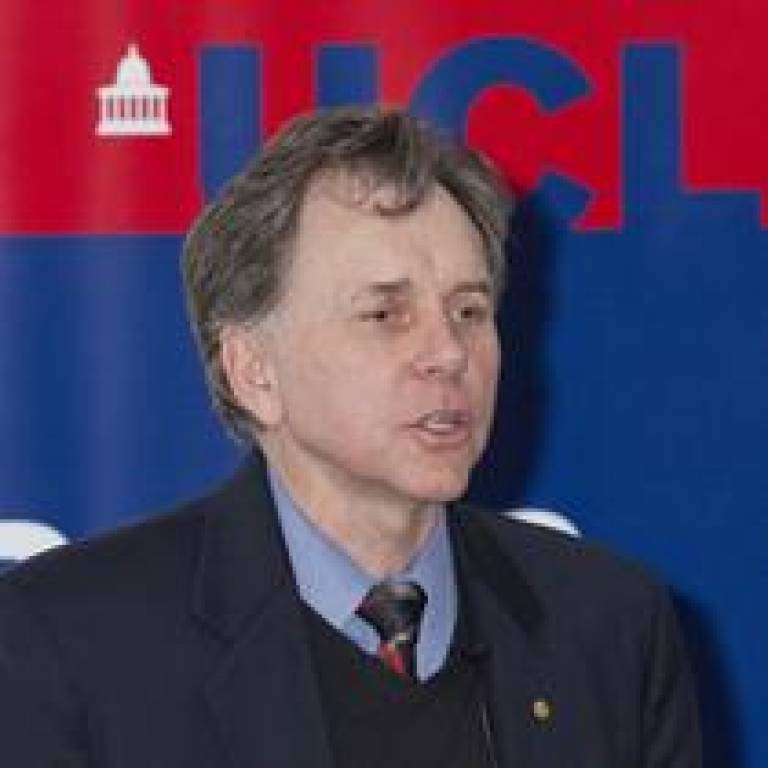Review: Professor Barry Marshall's 2010 Clinical Prize Lecture
23 September 2010
PhD student Gavin Sewell describes the unorthodox experimentation, courage and tenacity of Nobel Prizewinner Professor Barry Marshall, who gave the 2010 UCL Clinical Prize Lecture.

"On 20 September a group of seven UCL MB PhD students, including myself, were fortunate enough to meet Professor Barry Marshall, 2005 Nobel Laureate in Physiology or Medicine, prior to his UCL Prize Lecture in Clinical Science. Professor Marshall pioneered the discovery of Helicobacter Pylori, and its association with gastroduodenal diseases.
We met Professor Marshall in the Wilkins building in the heart of UCL. Admittedly, we all felt a little awestruck. Even in UCL, it isn't every day that one has the opportunity to speak with a Nobel Prize winner! However, we managed to overcome this to discuss Professor Marshall's current plans and his background, as well as our own personal research projects and ambitions.
During our meeting and the subsequent lecture, we were able to glean some insights into the life, work and character of a world-renowned scientific researcher. I was struck by Professor Marshall's tenacity and determination, which was particularly apparent when he spoke of his most famous discovery - namely that Helicobacter Pylori cause peptic ulcers.
This work initially proved extremely controversial -
few gastroenterologists at the time were prepared to accept the idea that
stomach ulcers, which for decades had been thought to result from stress and
excessive acid secretion, could be due to small, spiral-shaped bacteria. How
could bacteria possibly survive in the acidic environment of the stomach, and
even if they did, surely they would be just another of the many harmless
commensal flora in the human intestine?
Professor Marshall described how he received rejection
letter after rejection letter from journals and conferences (it is a credit to
his sense of humour that he now has some of these framed in his office!). In
spite of this, he continued performing experiments, which ultimately
demonstrated that Helicobacter Pylori fulfilled Koch's postulates for causation
of stomach ulcers.
Some of these experiments came with personal sacrifices for Professor Marshall himself, including experiencing an acute Helicobacter infection after drinking a culture of the bacteria! His inspiration, conviction and courage led to one of the greatest discoveries of the 20th century, dispelling the established dogma and revolutionising the management of a common medical condition.
More recently, Professor Marshall has sought to find useful applications of Helicobacter in a wide range of areas. He wants to harness certain species of Helicobacter as tools for vaccination. Recently, he demonstrated that humans can never become immune to Helicobacter. This, coupled with the ability of the bacteria to persist in the stomach for years, makes them particularly attractive candidates for vaccine delivery.
On a different tack, Professor Marshall has been involved in using Helicobacter strains to study migration of human populations over thousands of years, helping to answer important anthropological questions. This demonstrated to me the importance of appreciating the wider context and implications of a scientific discovery - which could have the power to transform research in any number of different fields.
Overall, meeting Professor Marshall was certainly an inspiration to all of us, and I would like to thank UCL, and especially Professor Tony Segal, for organising a very successful meeting and Prize Lecture."
Watch Professor Marshall's lecture in full by clicking on the player below
Images from top: Professor Barry Marshall gives the UCL Prize Lecture in Clinical Science; Professor Marshall with UCL MB PhD students (Gavin Sewell is fourth from the left)
UCL Context
The MB PhD programme, co-founded by Professor Tony Segal and Professor N Woolf in 1994, allows a selected group of students to develop their basic science skills from BSc to PhD whilst completing their undergraduate medical education. The scheme aims to foster academically minded medical students who wish in the future to combine research with clinical medicine.
The annual UCL Prize Lecture in Clinical Science has become the pre-eminent series on contemporary science in Europe. The event provides an opportunity to debate and celebrate important scientific advancements.
 Close
Close

